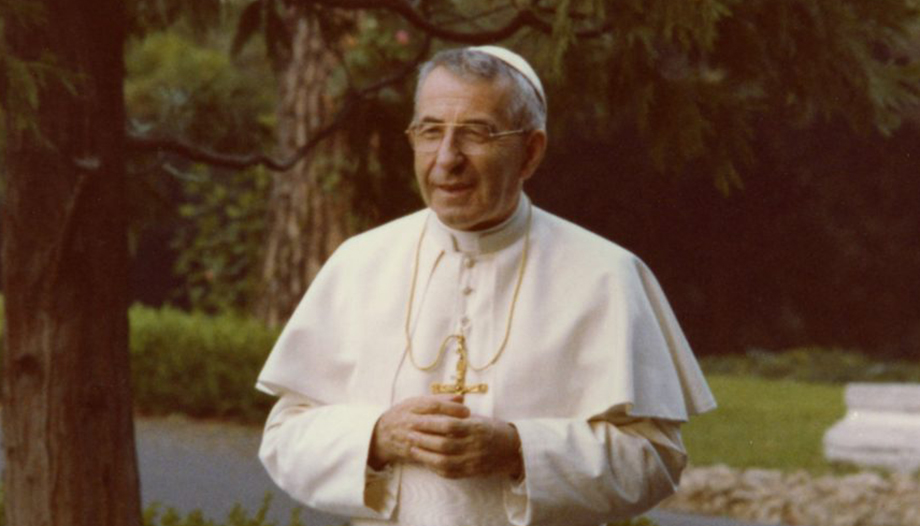Translation of the article into Italian
"Closeness, humility, simplicity, poverty and insistence on the mercy and tenderness of Jesus: these are the most salient features of his magisterium, which more than 40 years ago aroused attraction and which today remain more relevant than ever." Stefania Falasca, vice-president of the John Paul I Vatican Foundation, recalls the figure and work of Pope John Paul I. Pope of the smilein view of his beatification scheduled for September 4.
The occasion was provided by the usual meeting that the ISCOM Association promotes with Vaticanists and information professionals interested in the current affairs of the Catholic Church: a breakfast meeting attended this morning by some thirty journalists from the media in a place a stone's throw from St. Peter's in Rome.
Falasca, a Vaticanist and writer, has worked since 2006, when the diocesan investigation was concluded, as vice-postulator for the cause of beatification of John Paul IPasquale Liberatore and Monsignor Enrico Dal Covolo, and then Cardinal Beniamino Stella, who succeeded each other in the office until today. A long and demanding study of the documentary sources on Albino Luciani, which led her to emphasize, during the ISCOM meeting, first of all the "evangelical simplicity" of the Pope, and his ability to communicate "the substance of the Gospel" to all, "in the absolute coincidence between what he taught and what he lived".
A journey of no less than 15 years, with a research that has involved more than 70 archives in different places, of deep historical and historiographical depth.
Immediately after his death", Falasca observes, "it was Professor Vittore Branca, who was close to Luciani during the years of his patriarchate in Venice, who focused on the Pope's pastoral attitude: a great simplicity. A Pope faithful to the doctrine of St. Francis de Sales, a saint who was very dear to him since his adolescence, when he read the Philothea and the Treatise on the Love of God. Luciani was the shepherd nourished by human wisdom, who lived all the evangelical virtues. A shepherd who precedes and lives in the flock with the example, without any separation between the spiritual life and the exercise of the government".
On the role of the Church in the service of humanity, it is worth recalling the words pronounced by Luciani himself in his homily at the beginning of his pontificate (September 3, 1978): "May the Church, humble messenger of the Gospel to all the peoples of the earth, contribute to create a climate of justice, fraternity, solidarity and hope, without which the world could not live".
Closer to the pain of the people, "a Church," Falasca concludes, "not self-referential, rooted in that never forgotten treasure of an ancient Church, without worldly triumphs, that lives by the reflected light of Christ. Close to the teaching of the great Fathers and to which the Council had returned".
The legacy of the Second Vatican Council constitutes, then, the inspiration and the trace of an ephemeral pontificate - a heart attack ended Luciani's life, according to the reconstruction of the history and the clinical documentation, as well as the depositions acquired during the process - and at the same time of rigorous actuality. This is eloquently attested by the six "we want" of the radio message Urbi et orbi pronounced in Latin by John Paul I the day after his election, on August 27, 1978.
Falasca recalls them punctually: "We want to continue in the continuity of the legacy of the Second Vatican Council (...) an impulse of renewal and life"; "We want to maintain intact the great discipline of the Church (...) both in the exercise of the evangelical virtues and in the service of the poor, the humble, the defenseless (...). We wish to remind the whole Church that her first duty is evangelization (...) We wish to continue the ecumenical commitment with attention to all that can foster union (...) We wish to continue with patience and firmness in that serene and constructive dialogue which Paul VI placed as the foundation and program of his pastoral action (...). Finally, we want to encourage all initiatives that can safeguard and increase peace in a troubled world".
Priorities that have nourished the thirty-four days of a pontifical throne dedicated to episcopal collegiality, service to ecclesial poverty, the search for Christian unity, interreligious dialogue and dialogue with the contemporary world, in favor of justice and peace.
Perspectives that resonate clearly today, in the opinion of the Vice-President of the John Paul I Vatican Foundation: "These six we want help to highlight a Pope as a point of reference in the history of the universal Church. In the light of the papers of the private archives, of the texts and of the interventions of the pontificate, it is now easier to deepen in the master lines of Albino Luciani's magisterium for a conciliar Church close to the people and to their thirst for charity".











